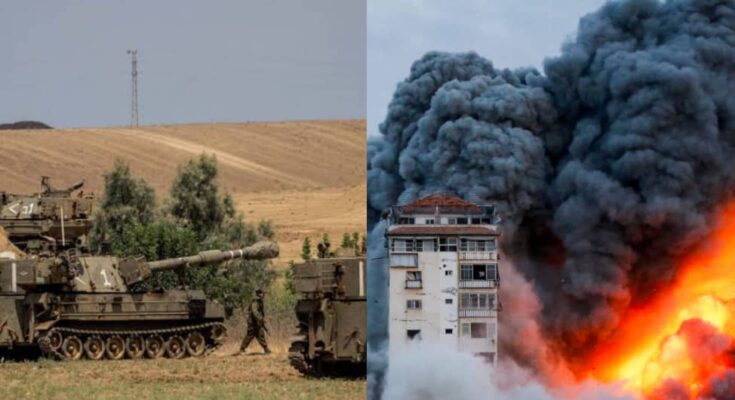By Oluwayanmife Ayobami
In recent days, there has been intense violence and conflict between the Palestinian militant group Hamas and Israel.
This situation has led to loss of lives, destruction, and heightened tensions in the region.
In this article, we will provide a simplified explanation of the events and key players involved.
What is Hamas?
Hamas is a Palestinian Islamist militant group that was founded in 1987 during the First Intifada. It emerged as an offshoot of the Egyptian Muslim Brotherhood and initially had a nonconfrontational approach towards Israel. However, Hamas later adopted a more confrontational stance and declared its goal of liberating Palestine, which includes modern-day Israel, from Israeli occupation. Their aim is to establish an Islamic state encompassing the present-day territories of Israel, the West Bank, and the Gaza Strip.
Over the years, Hamas has engaged in several conflicts with Israel, launching rockets and carrying out attacks against Israeli targets. Despite their opposition to Israel’s existence, Hamas has indicated that it would be willing to accept a truce if certain conditions are met. These conditions include Israel’s withdrawal to the 1967 borders, the payment of reparations, the allowance of free elections in the territories, and the granting of the right of return to Palestinian refugees.
What is The Gaza Strip?
The Gaza Strip is a small and densely populated territory situated between Israel, Egypt, and the Mediterranean Sea. Throughout history, it has seen various forms of governance and control. In the early 16th century, it became part of the Ottoman Empire. After World War I, it came under British control as part of the British Mandate of Palestine.
Following the 1948 Arab-Israeli War, Egypt assumed administration of the newly formed Gaza Strip. However, in the Six-Day War of 1967, Israel captured the territory and gained control over it. Since then, Israel has regulated the airspace and shoreline of the Gaza Strip, while Egypt has maintained control over the border crossings.
This complex geopolitical situation has contributed to the challenges and restrictions faced by the population living in the Gaza Strip. The area’s status and control remain a contentious issue in the ongoing Israeli-Palestinian conflict.
Reasons behind their conflict
The conflict between Hamas and Israel is rooted in longstanding political and security issues. Hamas, driven by its anti-Israel stance, has regularly launched attacks on Israel using rockets and other means. In response, Israel has conducted air strikes on Hamas targets and implemented a blockade on the Gaza Strip to ensure its security.
The recent cross-border attack by Hamas on a major Israeli holiday resulted in the deaths of hundreds of Israeli civilians. This attack followed weeks of heightened tensions along the Gaza-Israel border and heavy fighting in the Israeli-occupied West Bank. Hamas’s military wing leader, Mohammed Deif, stated that the attack was a response to the Gaza blockade, Israeli raids in the West Bank, incursions at the al-Aqsa mosque, and increasing attacks by Israeli settlers.
There are also suggestions by some foreign observers that Hamas may have been motivated by the progression of peace talks between Israel and Saudi Arabia, as Hamas would have wanted to prevent further normalization of Israel’s relations with Arab neighbors.
Regardless of the specific motivations, the scale and coordinated nature of the attack caught Israel’s military and intelligence services by surprise. Israel has vowed to respond severely to the attack and has indicated that it will be a long and challenging process.
The ongoing conflict underscores the complex dynamics, historical grievances, and security concerns that underlie the broader Israeli-Palestinian conflict. Resolving these issues will require sustained efforts and a comprehensive approach to address the underlying causes and promote a lasting peace in the region.
What are the potential impact
The ongoing conflict between Hamas and Israel remains highly volatile, with concerns about further escalation. Hamas has called on Palestinians and other Arabs to join their operation against Israel, raising the possibility of a broader conflict involving other groups and neighboring countries. Israel has responded by ordering a significant reinforcement of its troops and has not ruled out the possibility of a ground operation in Gaza.
Hamas militant commander Mohammed Deif’s call for support from Palestinians and other Arabs adds to the uncertainty of the situation. The response from Palestinians in the occupied West Bank, East Jerusalem, and the wider region will play a crucial role in determining the course of events.
Israel is acutely aware of the potential for a multi-front war and the involvement of groups like Hezbollah, a powerful Lebanese militant organization. In a recent incident, Hezbollah launched missiles and shells at northern Israel, causing no casualties but underscoring the risk of escalation.
Recognizing the severity of the situation, the Israeli military has ordered a massive reinforcement of troops. Alongside intense air raids on Gaza, Israel has expressed its intention to plan a ground operation in the area.
Amidst these developments, the international community closely monitors the situation, emphasizing the need for de-escalation, dialogue, and a comprehensive approach to address the underlying issues fueling the conflict.








